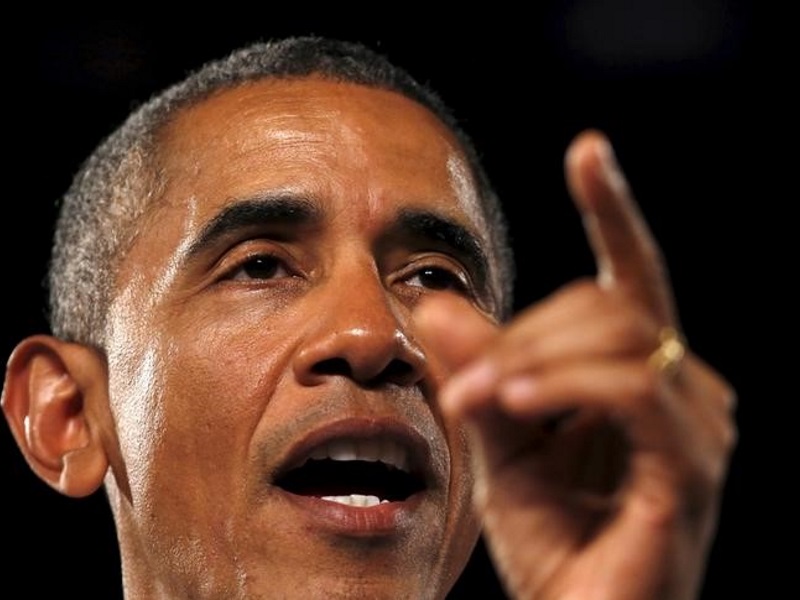- Home
- Internet
- Internet News
- Obama Warns China on Cyber Spying Ahead of Xi Visit
Obama Warns China on Cyber Spying Ahead of Xi Visit

With Chinese President Xi Jinping set to visit Washington next week, Obama told a group of company chief executives that cyber-security would be a major focus in his talks with Xi, a topic that has become a point of friction in US-Chinese relations.
A person briefed on the White House's thinking said on Tuesday the United States does not plan to impose sanctions on Chinese entities for economic cyber-attacks ahead of Xi's visit to avoid what would be seen as a diplomatic disaster.
The United States has emphasized to China that industrial espionage by its government or its proxies in cyberspace goes beyond traditional intelligence gathering, Obama said.
"That we consider an act of aggression that has to stop," Obama told the Business Roundtable, a lobbying group.
Obama said the United States is preparing measures to show the Chinese "this is not just a matter of us being mildly upset, but is something that will put significant strains on a bilateral relationship if not resolved and that we are prepared to take some countervailing actions."
White House spokesman Josh Earnest later said Obama was "intentionally non-specific" in the comments and said the US government is "hopeful" that it will not need to use sanctions or other measures against China for cyber-attacks on US commercial targets.
"It is clear that the Chinese government is being responsive to those concerns by at least engaging in a candid discussion of those issues," Earnest told reporters.
Obama told business leaders that he would like to see a "basic international framework" for governments on cyber-security, perhaps resembling existing global nuclear agreements - a deal that would require "tough negotiations" that could take years.
"If we and the Chinese are able to coalesce around a process for negotiations, then I think we can bring a lot of other countries along," Obama said.
Obama said the United States is equipped to "go on offence" against rival nations. "We don't want to see the Internet weaponised in that way."
In referring to nuclear arms control regimes, Obama was most likely thinking about "norms," rather than governance, since the US has not advocated creating an agency like the International Atomic Energy Agency to monitor cyber weapons, said Bruce McConnell, a former Department of Homeland Security cyber-security chief.
Those principals could include agreements to refrain from attacking critical infrastructure during peacetime, and responding to requests for help with attacks.
"I don't think the president was talking about the structure - I think he was talking about the ideas," said McConnell, who now works on multilateral cyber-security issues for the nonpartisan, international EastWest Institute.© Thomson Reuters 2015
For the latest tech news and reviews, follow Gadgets 360 on X, Facebook, WhatsApp, Threads and Google News. For the latest videos on gadgets and tech, subscribe to our YouTube channel. If you want to know everything about top influencers, follow our in-house Who'sThat360 on Instagram and YouTube.
Related Stories
- Samsung Galaxy Unpacked 2025
- ChatGPT
- Redmi Note 14 Pro+
- iPhone 16
- Apple Vision Pro
- Oneplus 12
- OnePlus Nord CE 3 Lite 5G
- iPhone 13
- Xiaomi 14 Pro
- Oppo Find N3
- Tecno Spark Go (2023)
- Realme V30
- Best Phones Under 25000
- Samsung Galaxy S24 Series
- Cryptocurrency
- iQoo 12
- Samsung Galaxy S24 Ultra
- Giottus
- Samsung Galaxy Z Flip 5
- Apple 'Scary Fast'
- Housefull 5
- GoPro Hero 12 Black Review
- Invincible Season 2
- JioGlass
- HD Ready TV
- Laptop Under 50000
- Smartwatch Under 10000
- Latest Mobile Phones
- Compare Phones
- Moto G15 Power
- Moto G15
- Realme 14x 5G
- Poco M7 Pro 5G
- Poco C75 5G
- Vivo Y300 (China)
- HMD Arc
- Lava Blaze Duo 5G
- Asus Zenbook S 14
- MacBook Pro 16-inch (M4 Max, 2024)
- Honor Pad V9
- Tecno Megapad 11
- Redmi Watch 5
- Huawei Watch Ultimate Design
- Sony 65 Inches Ultra HD (4K) LED Smart TV (KD-65X74L)
- TCL 55 Inches Ultra HD (4K) LED Smart TV (55C61B)
- Sony PlayStation 5 Pro
- Sony PlayStation 5 Slim Digital Edition
- Blue Star 1.5 Ton 3 Star Inverter Split AC (IC318DNUHC)
- Blue Star 1.5 Ton 3 Star Inverter Split AC (IA318VKU)

















